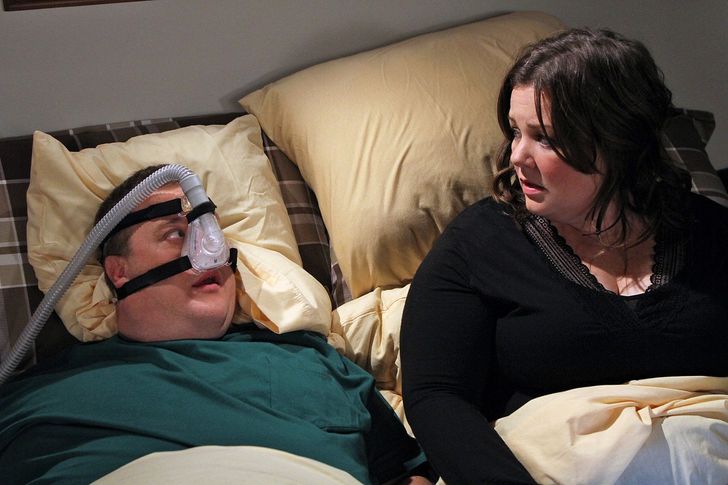My father used to snore a lot. Sometimes I would even hear it from another room at night.. My mom learnt to sleep through it
According to a Study, Sleeping With a Snorer Can Take a Toll on Your Health
It’s hard to deny that living with a snorer can be challenging, especially if that person is someone you share the same room or bed with. But the consequences of second-hand snoring have recently been discovered and go far beyond being a simple nuisance.
We at Bright Side care about your well-being and here’s everything you need to know about the health risks of living with a snorer:
1. Insufficient sleep
This seems to be the most obvious consequence, but lack of sleep leads to health problems that we often don’t take seriously. Both the snorer and those who live with them can lose many hours of sleep, which are vital for the body to recover and fulfill biological functions, like memory consolidation and metabolism regulation.
It’s not just about getting enough sleep, but about doing it continuously. Spouses of people with sleep apnea tend to wake up almost as many times as they do, preventing all the phases of sleep from being completed and further damaging the biological mechanisms involved in that process.
In addition, a person who doesn’t get enough rest is prone to make more mistakes, think slowly, and lower their productivity. Another problem associated with this is constant irritability, which could have an effect on your relationships.
However, it has also been discovered that lack of sleep is a risk factor for anxiety and depression. And, beyond its psychological consequences, it also increases the chances of developing obesity or suffering from a stroke.
2. Relationship problems
The fact that your partner’s snoring doesn’t let you sleep can erode the relationship little by little. Listening to a person snoring by your side every night and having to wake them up to stop them from making noise will only make them feel upset. Many even choose to sleep separately or get a divorce after trying to use earplugs or hearing aids to reduce the noise, without getting good results.
We’ve already talked about some consequences of not sleeping well, but if this is caused by your partner or a family member, they become the main reason for your bad mood and the primary target of your anger.
These conflicts impact your health in a bad way, since it has been proven that a negative atmosphere at home can cause stress, inflammation, and changes in appetite. The immune system is also weakened by constant arguing.
3. Hearing loss
A study by Queen’s University in Ontario, Canada, sought to evaluate the effects of snoring on both the snorers and their spouses. They selected 4 couples in an age range between 35 and 55 in which one of the members had severe sleep apnea.
The conclusion they reached was that the effect of the snoring sound didn’t affect the snorers as much. This is because the brain dampens respiratory interruptions during sleep. But 100% of their partners suffered the consequences, especially in the ear exposed to snoring.
4. Hypertension
The loud noises not only affect hearing, but they can also raise blood pressure to risky levels, especially for other diseases, according to research from the Imperial College of Science in London, which assessed the stress of people living near several European airports.
Their findings determined that, the higher the volume of noise, the greater the risk of hypertension. They realized that the body always reacted in the same way, regardless of whether the patient woke up with the noise or not.
They also discovered that these results could be transferred to any sound of more than 35 decibels, so people exposed to snoring were also at risk, since it can reach 80 decibels. Hypertension can lead to other diseases, such as kidney problems, dementia, and heart disease.
Dangers of second-hand snoring
Here are some possible consequences, direct and indirect, of sleeping near a person who snores:
- Sleep deprivation and poor quality of sleep
- Irritability
- Daytime sleepiness
- Loss of concentration and memory
- Depression
- Anxiety
- Stress
- Weakness of the immune system
- Obesity
- Heart failure
- Dementia
- Hearing loss
- Hypertension
- Renal problems
- Stroke
How to prevent these problems
Sleeping with a snorer is an ordeal, especially when you have already tried everything to make your nights more bearable. If the headphones and earplugs no longer work, you could (if possible) go to sleep in another room and be with your partner at times that do not affect your rest.
A smart pillow is being developed for the snoring partner, which will allow the snoring noise to be canceled out with an equal and opposite sound frequency. However, it has not yet reached the market, so this is a solution that you’ll only be able to use in the future.
You could also take a look at these tricks for those who want to stop snoring. They can be useful to regain harmony and, what’s most important, health in your home.
Have you ever slept with a snorer? How did you cope with it? Tell us about your experience and share this article with your family and friends.
Comments
Oh my, how? This sound is sooooooo annoying
she told me her secret - she just needed to fall asleep faster than him. Then she wouldn't hear it
uhm.. doesn't work with me. My bf snores too and it instantly wakes me up at night
What do you do then?
I just poke him and make him turn to another side or so. Usually helps ?
Related Reads
11 Plot Twists That Could Even Make Hollywood Jealous

10+ People Whose Love Can’t Be Destroyed by Routine and Everyday Struggles

12 People Share the Most Shocking Gifts They Got for Christmas

My Sister-in-Law Secretly Performed a DNA Test on My Toddler

20+ People Whose Good Deeds Prove That Evil Doesn’t Stand a Chance in Our World

11 True Stories That Took Us on an Emotional Roller Coaster

15 Family Members Who Turn Ordinary Days Into Extraordinary Adventures

15 True Stories That Made Us Say, “The World Has Real Angels in It”

I Stole the Spotlight From My Cousin and His New Wife After He Proposed at My Wedding

14 True Stories That Remind Us Life Is Full of Suprises and Magical Twists

9 Pedicure Ideas to Keep Your Feet Ready for Summer

17 Nannies Who Have a Thrilling Story to Tell







